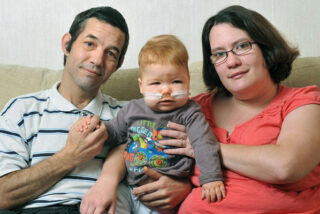When is my brother/sister coming home from the hospital?
Explain that their sibling will come home as soon as the doctors and nurses decide that he/she is well enough. Children need age-appropriate, accurate information about what is/will be going on at the hospital. Try to include them in hospital-related conversations, whenever appropriate.
What can I do to make my brother/sister get better?
It‘s important to explain to your children that just as it was not their fault that their sibling became ill, there is also nothing they can do that will make them worse or completely better. The doctors’ and nurses’ job is to help their sibling get better, and their job is to help cheer their sibling up while they’re not feeling well.
What will the hospital do to take care of my brother or sister?
Children are often curious about why their brother/sister has to stay at the hospital and what exactly goes on there. Reassure your children that nurses and doctors go to school to learn how to help children who are sick. If a child understands why their sibling is sick, explain to them in simple terms what the nurses and doctors are doing to help, for example, “The nurses will be giving them medicine to help their brother or sister.” You can also explain that the nurses and doctors might take special pictures like X-rays or MRIs.
What does my brother or sister do all day in hospital?
Many children worry about their sibling’s basics such as food, clothing, sleeping arrangements and playing. Tell them how their sibling orders meals which are brought to their room on a tray and that Mum/Dad can go to the cafeteria to eat. If it’s a long-term hospitalisation during the school year, their sibling may also be receiving school lessons with a teacher. When some children are ill in the hospital, they need extra rest to feel better. The doctors and nurses might give their sibling special medicine to help his/her body rest.
Why does my brother/sister have to be in the hospital?
Communication is a key part of establishing trust with your children and helping them to feel like an important part of the family. Be honest about why their sibling is in the hospital, but use simple terms that they can understand. You can explain the situation using language such as, “Your brother/sister is in the hospital because their _____ (body part) is ill. The doctors and nurses at the hospital have medicines and machines to try to help make him/her better.”
Why do you (parents) have to go to the hospital?
Explain to children that just as when they don’t feel well, they want Mum and Dad around, so does their sibling. Let them know that you are spending time at the hospital to help the doctors and nurses take care of their sibling.
Can I stay at the hospital, too? Can I visit?
Only Mums and Dads (or other carers) can spend the night at the hospital. Explain that there is not enough space in the room for everybody in the family to spend the night, and that your child can sleep in their own bed to continue their normal routine.
Children are usually allowed to visit during the day, but it is always best to give them the option of whether they would like to visit. If they decide to visit, prepare them for what they can expect to see and hear using honest, age-appropriate words, especially if their sibling looks or acts differently than they normally do. Sometimes children become bored during their visits to the hospital, so encourage them to bring a favourite activity from home and check with the staff about how children are included in activities on the unit and throughout the hospital. Younger children can become restless during prolonged visits so, if possible, try to have arrangements for them to go home if needed. If a child is unable to visit their sibling, encourage them to talk or text on the phone, email, or send a get well card from home.
Who will take care of me while you’re at the hospital?
Reassure children by letting them know that while you are at the hospital with their sibling, another responsible adult they trust will be there to make sure they’re taken care of. Try to stick to your child’s normal routine such as meals, play, rest and bedtime, whether it is you or another carer with them.
Will I catch what my brother/sister has?
Children can often be very egocentric and, while they love their sibling, the hospitalisation could cause them to be concerned for their own well-being. Make sure to explain in simple terms why their sibling is in the hospital and that it is not the kind of sick that they or you could catch. Siblings may also be concerned that if they get “sick” with a cold or another minor illness that they might also have to go to the hospital. It is important to explain why their brother or sister is sick and how their illness is different than their typical cold or sore tummy.
What is all that stuff in my brother’s/sister’s room? Who are all these people?
The hospital can often be an overwhelming environment for children. It’s important to prepare your children to visit their sibling in the hospital and the medical equipment they will see in the room. It can be helpful to explain to children that doctors and nurses use many types of medicines and machines to help kids in the hospital (e.g., “There is a special computer next to your brother’s/sister’s bed called a monitor. The nurses use the monitor to watch how his/ her body is doing. The monitor makes noises to help the nurses know how to best take care of them.”). If you have questions about how to explain the medical equipment, ask your nurse.
Do you care about my brother/sister more than you care about me?
Assure your child that you love them and their sibling equally and that you are spending extra time at the hospital so that their sibling feels less scared and less alone while they are there. To help your child feel like they are a priority, plan a special activity with just them or establish a small routine/ritual that you can maintain even during their sibling’s hospitalisation.
Is my brother/sister going to die?
Usually, when children bring a topic such as this up it’s because it’s something they are worried about. Your child may have had a relative or seen someone on TV who went to the hospital and died. If your child is facing a life-threatening illness, this may be an opportunity to discuss the situation and help your children understand and ask questions about what’s going on. You can use language such as, “We all hope that your brother/sister will get better but his/her body is very, very ill at the moment.” If their sibling is expected to recover, help to reassure your children by letting them know what the doctors and nurses are doing to help their sibling and when/how they are going to come home.



